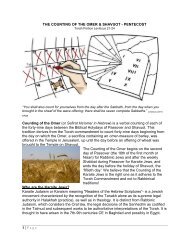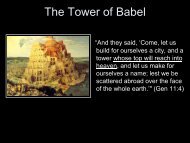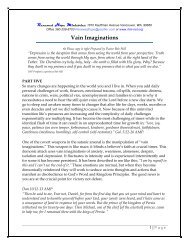Which of the Ten Commandments Did Jesus Repeal? - Rhm-Net.org
Which of the Ten Commandments Did Jesus Repeal? - Rhm-Net.org
Which of the Ten Commandments Did Jesus Repeal? - Rhm-Net.org
You also want an ePaper? Increase the reach of your titles
YUMPU automatically turns print PDFs into web optimized ePapers that Google loves.
God. If you want to know how to perform <strong>the</strong> Laws <strong>of</strong> God ask Him to show you. Tryconsidering <strong>the</strong> eleven questions I have listed above; “when <strong>the</strong> Spirit <strong>of</strong> Truth comes, he willguide you into all <strong>the</strong> truth; John 16:13-14 CJB<strong>Which</strong> <strong>of</strong> <strong>the</strong> <strong>Ten</strong> <strong>Commandments</strong> <strong>Did</strong> <strong>Jesus</strong> <strong>Repeal</strong>?Was <strong>the</strong>re something wrong with <strong>the</strong> <strong>Ten</strong> <strong>Commandments</strong>? Were <strong>the</strong>y weak legislation in <strong>the</strong>first place? <strong>Did</strong> <strong>the</strong>y somehow become obsolete with <strong>the</strong> passage <strong>of</strong> time? Some teach <strong>the</strong> lawhas passed away if that is true, it would mean <strong>the</strong> <strong>Ten</strong> <strong>Commandments</strong> were abolished. If true<strong>the</strong>re must have been a reason for it. When we do repeal laws, why do we do it? There aremany reasons for abolishing laws.1. The law may be unenforceable.2. It may be unpopular with <strong>the</strong> people, and because <strong>of</strong> massive disobedience it isrepealed.3. The law simply can’t be maintained.The classic example <strong>of</strong> this was <strong>the</strong> prohibition <strong>of</strong> alcohol in <strong>the</strong> early 19 th century. We couldpoint to dozens <strong>of</strong> examples, but <strong>the</strong>re is still only one fundamental reason for <strong>the</strong> repeal <strong>of</strong> alaw; it was a bad law in <strong>the</strong> first place, or it became a bad law in time. For which <strong>of</strong> <strong>the</strong>sereasons did <strong>Jesus</strong> repeal <strong>the</strong> <strong>Ten</strong> <strong>Commandments</strong>? Do you see <strong>the</strong> problem we’re dealing with?Its one thing to create a doctrinal argument to <strong>the</strong> effect that God abolished <strong>the</strong> law, but it’sano<strong>the</strong>r matter altoge<strong>the</strong>r to explain why such a thing law should be obeyed.This brings us logically to <strong>the</strong> next question. The question is simple enough.What Happens When A Law Is <strong>Repeal</strong>ed?The answer is simple. When a law has been abolished or repealed, it is no longer a crime tobreak that law. Technically you cannot break it because it no longer exists. An action thatpreviously was considered a crime, worthy <strong>of</strong> punishment is now deemed acceptable.During prohibition, you could have gone to jail for having alcohol in <strong>the</strong> trunk <strong>of</strong> your car.After prohibition was repealed, that same alcohol made you no more a criminal than asuitcase full <strong>of</strong> clo<strong>the</strong>s. Once a law is repealed or abolished, <strong>the</strong>re are no more penalties, nomore guilt, no fines, no imprisonment not even an admonition from <strong>the</strong> judge. You cannotbreak <strong>the</strong> law, for it is no longer a law.Perhaps <strong>the</strong> laws <strong>of</strong> God are different. Can <strong>the</strong> <strong>Ten</strong> <strong>Commandments</strong> be abolished and yet itstill is wrong to break <strong>the</strong>m? If <strong>the</strong> laws have been abolished <strong>the</strong>n so were <strong>the</strong> <strong>Ten</strong><strong>Commandments</strong>. John categorically defined sin, so no one could misunderstand: “Sin is <strong>the</strong>transgression <strong>of</strong> <strong>the</strong> law” (I John 3:4). What happens to sin, <strong>the</strong>n, if <strong>the</strong> law is abolished? Listento Paul’s reply: “For where no law is, <strong>the</strong>re is no transgression” (Romans 4:15). Later in <strong>the</strong> sameepistle, Paul affirms, “Sin is not imputed when <strong>the</strong>re is no law” (Romans 5:13).Let’s see if we can understand what this means. Suppose for a moment <strong>the</strong> Commandment“Thou shalt not steal” is abolished. (if <strong>the</strong> <strong>Ten</strong> <strong>Commandments</strong> are abolished, that law nolonger exists). Since <strong>the</strong>re is no transgression where <strong>the</strong>re is no law, <strong>the</strong>n it is not a transgression









